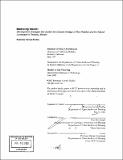Balancing values : development strategies that sustain the cultural heritage of rice paddies and the natural landscape in Thimphu, Bhutan
Author(s)
Dudley, Rosemary Carolyn, 1975-
DownloadFull printable version (18.98Mb)
Other Contributors
Massachusetts Institute of Technology. Dept. of Urban Studies and Planning.
Advisor
Eran Ben Joseph.
Terms of use
Metadata
Show full item recordAbstract
This thesis focuses on the impending urban development of the terraced rice paddies in the valley surrounding Bhutan's capital city, Thimphu. It makes the argument that this unique landscape is deeply rooted in Bhutanese culture and its preservation can provide Bhutan with environmental, cultural and economic benefits. Escalating development pressures are such that the government cannot salvage the paddies at any cost, but sensitive development strategies can mitigate development's impact on the terraced land and the bodies of water that have supported life in the valley for centuries. This thesis argues that it is possible and necessary to absorb the current and predicted growth without obliterating the valley's previous use. The Royal Government's agendas to maintain Bhutan's living cultural heritage, sustainable "middle path" development strategy, and self-sufficiency cannot be fulfilled if agricultural land is not valued as a resource. Issues of government capacity, coordination between the Ministries, reliance on modern methods of development, and the exclusion of agricultural land in the nation's conservation efforts have prevented a holistic development plan from being realized. In response, this thesis offers six guiding principles that can help preserve the cultural, agricultural, and natural landscape. Stressing the environmental and cultural risks involved in rapid development of the traditional landscape, the principles offer recommendations to value traditional sources of livelihood, undeveloped land, environmentally and culturally sensitive development, and the inclusion of communities through participation. They provide sustainable development approaches that balance and recognize the cultural, environmental, and economic value of the farmland and existing housing settlements. An overview of international urban development precedents that demonstrate these principles offer insight on how Bhutan can remedy these risks and benefit economically. Last, specific mechanisms that can guide the government in their development process will make preservation of the traditional landscape realistic. In conclusion, Bhutan can provide culturally and environmentally sensitive urban development that does not detrimentally impact the landscape and its inhabitants.
Description
Thesis (M.C.P.)--Massachusetts Institute of Technology, Dept. of Urban Studies and Planning, 2002. Includes bibliographical references (p. 125-128).
Date issued
2002Department
Massachusetts Institute of Technology. Department of Urban Studies and PlanningPublisher
Massachusetts Institute of Technology
Keywords
Urban Studies and Planning.